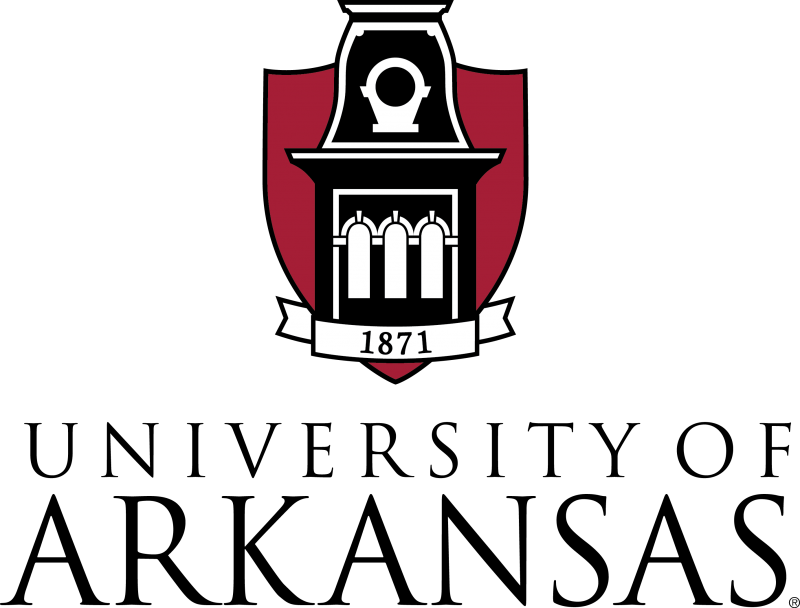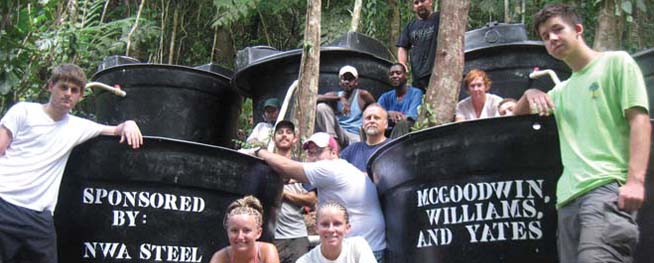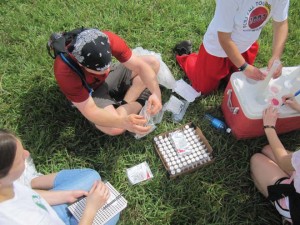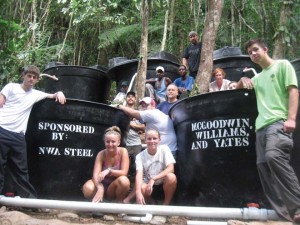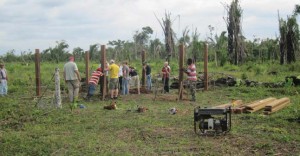By April Robertson
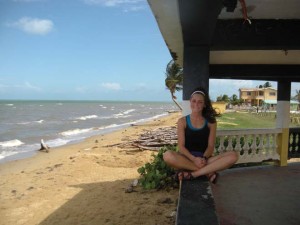
“I really enjoyed learning things from the field experience that can’t be taught in the classroom… It made me appreciate more things and acknowledge things we have here.”
Cary Beth Lipscomb, civil engineering student and recipient of the AACE Julian and Nana Stewart scholarship
Students at the University of Arkansas who have a love for civil engineering, water quality, philanthropy or travel have a unique opportunity in the Belize study abroad program. Started a little more than six years ago with the assistance of the not-for-profit company Peacework, the program is designed to pool students’ collective skills and talents to assist communities in projects that improve the quality of life, whether that means providing cleaner water to residential homes and school buildings or building better facilities for schoolchildren.
A Multidisciplinary Experience
Engineering students are only one of the student groups that participate. They join students in education; agricultural, food and life sciences; business; biological sciences and social work to help make communityprioritized projects a reality.“In the program, we typically have 35-70 people, 10-17 of which are engineering majors,” said Thomas Soerens, associate professor of civil engineering and the group’s faculty advisor. “Engineering is usually the biggest group.”
Students in all majors are encouraged to branch out, mingle with the other students and try their hand at something new.
“Everyone stays together and eats meals together,” Soerens said. And while working on projects in the field, each student has the opportunity to work in an area they are unfamiliar with, helping them to a well-rounded experience and teaching them to be flexible by learning other skills. For example, when the business students were focused on building a community park, engineering students got involved.
Civil engineering student Cary Beth Lipscomb explained that participating in the Belize program gave her a new perspective on engineering, as well as life in general. “I really enjoyed learning things from the field experience that can’t be taught in the classroom,” she said. “We did a little bit of everything and it was good to get experience in all areas. Culturally, it’s such a different place from here. It made me appreciate more things and acknowledge things we have here.”
An International Partnership

U of A engineering students make new friends and experience a different culture in Dangriga, Belize.
The Belize program is that it focuses on resolving issues that the community has already prioritized. Soerens and his team prefer not to think of their projects as “helping” the community so much as partnering in projects they want to do.By returning to the same towns each year, the program hopes to establish a healthy working relationship that can prove more profitable overall, rather than moving from town to town across different provinces and countries.
Water Makes the World Go ‘Round
Over the years, the students in the Belize program have focused most closely on water quality because of its immediate connection to health. Issues with water quality are often the biggest problem for people living in developing communities, where governments provide water towers or water pumps, but leave it to the town or village to set up pipes and pumps and pay for operation of the system. It is often not a feasible expectation and leaves residents with low-quality water and limited access to it. “The EU will sometimes build a water tower in a community but the town has to maintain the operation costs, which means the electricity is too expensive,” Soerens said.
Past projects have revolved around making facilities functional and comfortable for schools, such as creating a water bottle filling station, building an outdoor classroom gazebo, and constructing a solar heater. Students have also focused on watershed analysis for the village of Steadfast, a process that included water-quality monitoring and water filtration that flows to a nearby community.“The goal was protecting the source,” Soerens said. “If the water system is compromised by agricultural systems, the farms in watershed, with the use of pesticides,” that will greatly affect the water people are drinking.
With the help of Soerens and his students, Steadfast now has a good water system and future trips can focus on making a similar impact on some of the surrounding communities.
A Little Help From Friends
In the past few years, the annual study abroad program has been supplemented with projects conducted independently by the student organization Arkansas Engineers Abroad.
The group raises funds year round for plane tickets to Belize, construction materials and the assistance of professional engineers in design of future construction projects.
The core of the group is made up of roughly 10-12 students who are passionate about using their skills to help others. They meet weekly to continually recalibrate their goals: drafting professional letters to companies that could sponsor them, meeting with department heads and faculty members to discuss the relevant connection between their classes and their international projects, which sometimes leads to additional funding, and to create local fundraisers as well as organize local service opportunities.
In the past three years, these groups have installed water pipes, conducted water quality sampling and attended multiple regional and national conferences to pick up critical techniques for doing these projects on their own.
The largest and most recent project by the student groups to date is the construction of a water tower for the community of More Tomorrow. Initial cost estimates for the endeavor were $18,000, a goal that Soerens says is nearly completed. If the financial goal is reach, students will be constructing the tower this summer.
